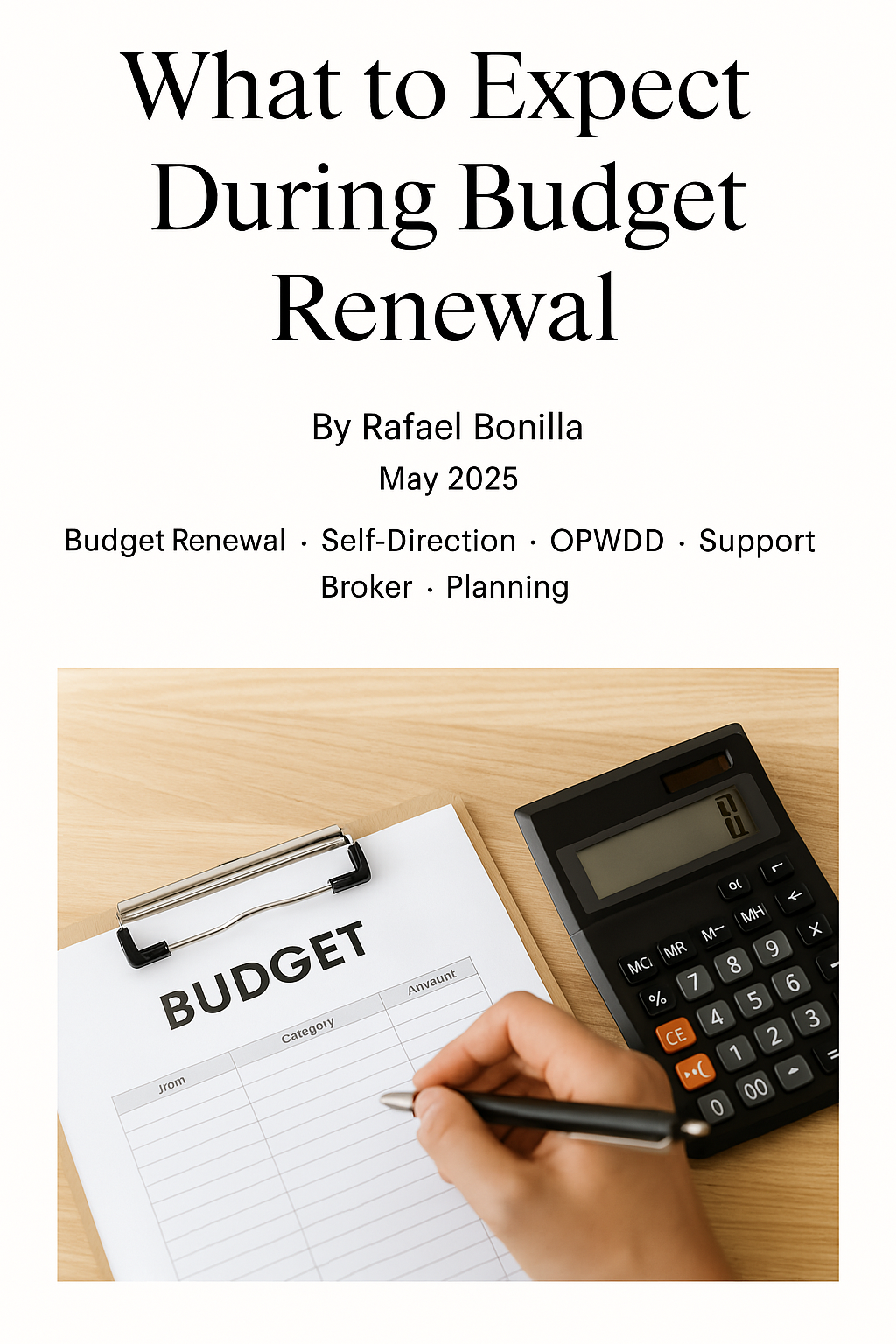What to Expect During Budget Renewal
For individuals and families participating in Self-Direction, the annual budget renewal process is one of the most important times of the year. It’s a chance to reassess goals, plan for upcoming services and supports, and ensure that your Self-Direction budget continues to reflect the needs and preferences of the person receiving services.
Whether it’s your first renewal or you’re a seasoned participant, this blog will walk you through everything you need to know about the budget renewal process — step-by-step.
What Is a Budget Renewal?
A budget renewal is a required process that takes place annually for individuals enrolled in the Self-Direction program under OPWDD (Office for People With Developmental Disabilities). It ensures that funding is appropriately allocated for the next 12-month period based on your current needs, services, and goals.
When Does Budget Renewal Happen?
Your budget renewal typically begins 90 days before your current budget end date. That three-month window is critical for reviewing your existing plan and preparing all necessary updates.
You’ll work closely with:
Your Support Broker
Your Care Manager
Your Fiscal Intermediary (FI)
Possibly your Self-Direction Liaison or Regional Office representative
Key Steps in the Budget Renewal Process
Here’s a breakdown of what you can expect from start to finish:
1. Initial Review of Current Budget
Timeframe: 90–75 days before the budget end date
Your Support Broker will start by reviewing:
Your current budget categories and usage (IDGS, Community Classes, Staffing, etc.)
Reimbursements submitted and remaining balances
Any unused funds or services that were underutilized
Your current valued outcomes and whether they still align with your goals
This is your chance to reflect:
What worked well this year?
What didn’t get used — and why?
Are there services you want to add, remove, or increase?
2. Care Manager Collaboration
Your Care Manager plays a key role by:
Updating your Life Plan
Ensuring valued outcomes are current and support your services
Including provider names and Service Authorization (SA) codes if needed
They will also coordinate with the Support Broker to make sure everything matches across both the Life Plan and the budget.
3. Budget Draft Preparation
Timeframe: 75–60 days before the budget end date
Your Support Broker will begin drafting the renewal budget using your Fiscal Intermediary’s required forms.
This includes:
Updating Self-Hired Staffing projections (Community Hab, Respite)
Entering new or adjusted IDGS items (classes, memberships, tech, etc.)
Including any new valued outcomes or Justifications
Verifying rate changes or updated costs (some services like classes may increase annually)
You’ll review this draft together and provide feedback before submission.
4. FI Submission and Review
Timeframe: 60–45 days before the budget end date
The completed renewal packet is submitted to the FI for internal review. They will:
Check for accuracy and compliance
Ensure all required documents are attached (updated Life Plan, Staff Action Plans, etc.)
Contact the broker or care manager if anything is missing
Once cleared, they’ll submit it to the local DDRO or Self-Direction Liaison for approval.
5. Waiting for Approval
Timeframe: Up to 30 days
The budget goes into pending status while the DDRO reviews it. They may:
Approve it as-is
Request clarifications or corrections
Reject it if critical information is missing (rare if submitted correctly)
It’s important to stay in touch with your broker and FI during this time.
6. Final Approval & Budget Start
Once approved, the budget becomes active on the day after your current budget ends.
You’ll receive a Final Approved Budget Sheet
Your self-hired staff will continue without interruption
Reimbursements and purchases can begin under the new plan
If you made any changes to services or staff pay rates, be sure those updates are communicated to your team.
Helpful Tips for a Smooth Renewal
Track your spending all year so you know what you’re using and what you’re not
Start early — don’t wait until the last month!
Communicate any life changes (school, job, living situation) to your team ASAP
Have a reliable system for gathering receipts and invoices for IDGS and reimbursements
Meet with your broker and care manager to brainstorm goals and new ideas
Common Changes Made at Renewal
Every year brings new possibilities. Here are a few examples of changes families often make during renewal:
Adding community classes or recreational memberships
Updating valued outcomes to match new interests or skills
Requesting more hours for Community Habilitation
Adding new self-hired respite staff
Increasing transportation support for work or community access
Replacing outdated technology or therapeutic tools
Reducing categories that weren’t fully used
Final Thoughts
The budget renewal process is not just paperwork — it’s an opportunity to reimagine what independence and support look like for the next year. With the right planning and teamwork, you can create a person-centered budget that truly supports meaningful growth and everyday success.
As your Support Broker, I’m here to guide you every step of the way. If your renewal is coming up, let’s get started early and make sure your next year is even better than the last.
Want help preparing for your upcoming renewal?
Schedule a consultation or Contact Tailored Independence LLC today!
Tailored Independence LLC
Rafael Bonilla, Support Broker
R.bonilla@tailoredindependence.com


